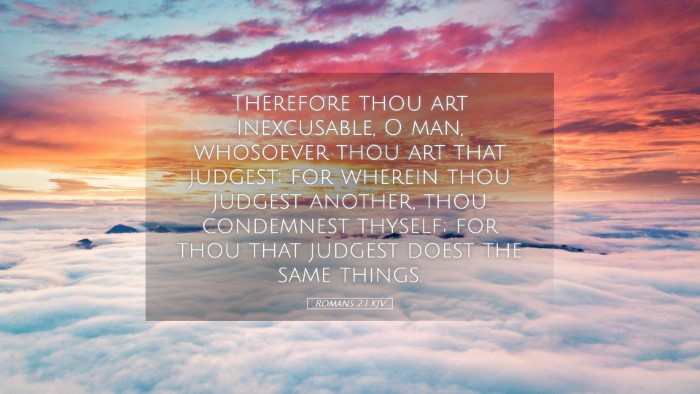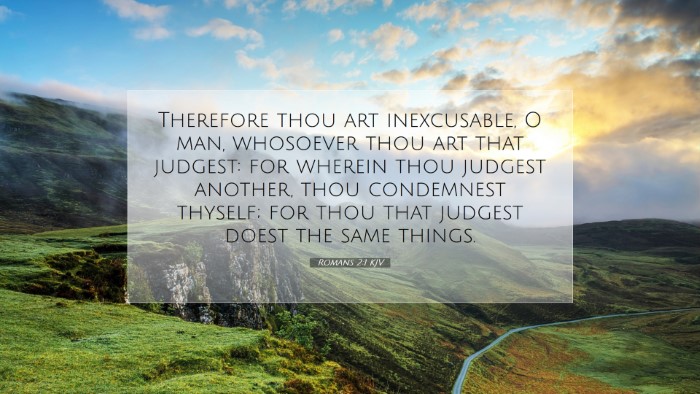Commentary on Romans 2:1
Verse: "Therefore you are inexcusable, O man, whoever you are who judge; for in whatever you judge another you condemn yourself; for you who judge practice the same things." (Romans 2:1)
Introduction
The Apostle Paul, in this passage, addresses the tendency of humans to judge others while being guilty of similar faults. His writing embodies a significant theological principle: the need for self-reflection and repentance before casting judgment on others.
Contextual Background
In the first chapter of Romans, Paul discusses the wrath of God against unrighteousness and the consequences of sin among the Gentiles. In chapter two, he transitions to address a Jewish audience and those who presume themselves to be righteous, highlighting the universal need for salvation.
Commentary Insights
Matthew Henry's Commentary
Matthew Henry emphasizes the idea that judging others reveals one's own failings. He notes that judgment often stems from pride and a false sense of righteousness. Henry warns that such hypocrisy not only harms the community but also leads to self-condemnation. He states:
"The judgment you impose breeches the law you profess to uphold, for mortals often find it easier to see the blemishes in others than to acknowledge their own."
He elaborates that spiritual insight requires humility and that those who judge must first turn their gaze inward.
Albert Barnes' Notes on the Bible
Barnes provides valuable insights regarding the term "inexcusable." He describes it as a lack of excuse for those who judge while being guilty themselves. He asserts that every judgment passed on others serves as a reflection of one's own actions. He states:
"When you criticize others, you implicitly admit the standard you have failed to meet yourself."
Furthermore, Barnes stresses the importance of compassionate understanding over judgment, urging readers to exercise caution lest they fall into hypocrisy.
Adam Clarke's Commentary
Clarke offers a profound analysis of Paul’s rhetorical strategy. He points out that by using the term "O man," Paul universalizes the message. This addresses both Jewish and Gentile sinners alike, signifying that no one escapes this indictment of hypocrisy. Clarke notes:
"The diversity of human faults varies, but the essential condition of our common humanity binds us in judgment."
Clarke also highlights the mercy of God and points out that escaping judgment comes only through the grace offered in Jesus Christ. In a state of gracious awareness, the faithful must acknowledge their own shortcomings before addressing the failings of others.
Key Themes
- Hypocrisy: The passage underscores the danger of hypocrisy amongst believers and spiritual leaders.
- Self-reflection: An essential call for introspection and moral self-assessment before critiquing others.
- Universal Judgment: The text highlights that all humanity stands equally accountable before God, thus dismantling any sense of moral superiority.
Practical Applications
Biblical scholars and practitioners can derive several practical applications from Romans 2:1:
- Encouragement towards Compassion: This verse encourages the faithful to approach others with empathy rather than condemnation, echoing Jesus' teaching of love.
- Community Accountability: Faith communities must promote an environment where constructive criticism is embraced but done in love and humility.
- Personal Responsibility: Individuals must take personal responsibility for their actions and sins rather than shifting blame or pointing fingers.
Conclusion
In Romans 2:1, Paul presents a vital reminder of the perils of judgmental attitudes. The call for introspection is a recurring theme throughout the Bible, leading believers to a deeper understanding of grace, mercy, and the heart of God. Each of the commentaries examined reflects on how essential it is for individuals to grasp their own faults before confronting the failures of others. Thus, Romans 2:1 serves not only as a warning but as an invitation to live out the transformative power of the Gospel.


